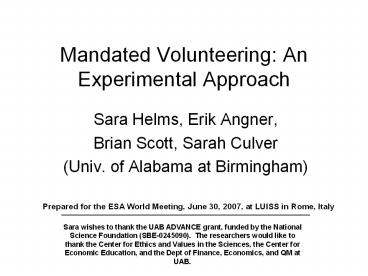Mandated%20Volunteering:%20An%20Experimental%20Approach - PowerPoint PPT Presentation
Title:
Mandated%20Volunteering:%20An%20Experimental%20Approach
Description:
Brian Scott, Sarah Culver (Univ. of Alabama at Birmingham) Sara wishes to thank the UAB ADVANCE grant, funded by the National Science ... – PowerPoint PPT presentation
Number of Views:22
Avg rating:3.0/5.0
Title: Mandated%20Volunteering:%20An%20Experimental%20Approach
1
Mandated Volunteering An Experimental Approach
- Sara Helms, Erik Angner,
- Brian Scott, Sarah Culver
- (Univ. of Alabama at Birmingham)
Prepared for the ESA World Meeting, June 30,
2007, at LUISS in Rome, Italy
Sara wishes to thank the UAB ADVANCE grant,
funded by the National Science Foundation
(SBE-0245090). The researchers would like to
thank the Center for Ethics and Values in the
Sciences, the Center for Economic Education, and
the Dept of Finance, Economics, and QM at UAB.
2
Background
- Field data suggest ambiguity
- Using a public goods game, we examine the impact
of mandates on the decision to donate time to
benefit a charity - Preliminary evidence suggests that the mandate
lowers the time donated, and reduces the variance
of time donations
3
Previous work
- Very little experimental work on volunteering
behavior - Empirical evidence on impact of mandated
volunteering (Helms, 2007) - Eckel, Grossman and Johnston (2005) use public
goods game to examine money donations to charity - Our experiment is modeled after their game, but
examines time donations to charity
4
Experimental setup
- Students randomly selected into treatment,
control groups - Control Students permitted to stay from 0 100
minutes - Treatment Students told to stay for 25 minutes
minimum. Permitted to stay up to 100 minutes - Each minute student completes menial task,
US0.20 allocated to charity of students choice
5
Preliminary results
Average, in minutes(std dev) Average US donated
Control(N 14) 56.50(38.77) 11.30
Forced (N 13) 49.85 (22.75) 9.97
6
(No Transcript)
7
(No Transcript)
8
Future Work
- More participants
- Sensitivity test framing problem?
- Alter experiment design length of mandate, etc.
- More games to study volunteer behavior and forced
volunteering
9
Grazie.































